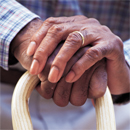 Aging is strongly associated with the onset of a number of chronic diseases, resulting in hospitalization and treatment of specific medical conditions. One of the most of common chronic diseases that affect the elderly is heart failure or the decreased capacity of the heart to pump blood to deliver oxygen to various tissues of the body. This condition also affects an individual’s capacity for breathing. Oxygen is an essential gas that is present in the atmosphere, entering our bodies through breathing. Heart failure is a serious medical condition because it worsens through time and thus can cause death.
Aging is strongly associated with the onset of a number of chronic diseases, resulting in hospitalization and treatment of specific medical conditions. One of the most of common chronic diseases that affect the elderly is heart failure or the decreased capacity of the heart to pump blood to deliver oxygen to various tissues of the body. This condition also affects an individual’s capacity for breathing. Oxygen is an essential gas that is present in the atmosphere, entering our bodies through breathing. Heart failure is a serious medical condition because it worsens through time and thus can cause death.
The general treatment of elderly patients diagnosed with heart failure include the administration of angiotensin-converting-enzyme (ACE) inhibitors, or drugs that relax and widen blood vessels, thus easing the circulation of blood from the heart to the rest of the body. Another type of drug treatment includes beta-blockers, which increase the amount of oxygen that could be transported through the blood, thus easing the patient’s breathing.
Advertisement
These two drugs are generally administered heart failure patients, but are these really effective for all types of patients? In a current clinical study design published last week in the journal Trials, the effects of each specific drug treatment for heart failure will be monitored in patients 80 years old and older. This clinical trial started in October 2011 and will continue on until December 2012. The main goal of the clinical trial was to determine the actual effect of each drug treatment scheme for elderly patients.
The proponents of the study explained that although ACE inhibitors and beta-blockers are the most common drugs administered to heart failure patients, the clinical performed on these drugs involved younger patients, within the age range of 61 to 71. Obviously, patients 80 years and older were not represented in the clinical trial. It is thus possible that older patients, especially those above 80 years of age, might respond differently to the drug treatment under scrutiny and this is not reflected in the description and effectiveness of the drugs. In addition, the aging process can also impart additional factors that need to be considered during the treatment design. Elderly patients above 80 years of age may have more medical diseases as compared to patients within 61 to 71 years of age and thus a treatment with ACE inhibitors or beta-blockers may result in a different response in the heart failure patient. Do these drugs really enhance breathing in above-80 year old patients?
The clinical trial will involve approximately 80 heart failure patients that are at least 80 years old. The study participants will be randomly classified into two study groups, one group will be given the classic treatment, which is the administration of at least one cardiovascular drug, whereas the other group with be subjected to an optimized treatment consisting of prescription drugs and regular day-hospital monitoring. The two study groups will then be assessed at the end of the study period for various indicators, including their quality of life, mortality, readmission for heart failure, breathing capacity, and development of other cardiovascular symptoms or events.
The study participants will also be examined for specific physical features, including walking capacity and breathing volume. The elderly are usually afflicted with difficulty in breathing and thus those with cardiovascular problems find breathing much more difficult to perform. The study participants will be asked to walk for approximately six minutes, during which they will be monitored in terms of heart rate and breathing. The number of breathing cycles at each minute will be monitored, in relation to the number of heart beats per minute. This walking test will also provide the investigators in determining whether the capacity and quality for breathing differs in each study group.
By the end of 2012, the results of this clinical trial will be complete and the actual benefits of drug treatment of above-80 year old patients will be determined. It would thus be interesting to know if each treatment is as effective as what the earlier clinical trial described, when younger patients were examined. If the results show similar outcomes, then this clinical trial will serve as a validation of the general treatment regimen for heart failure patients. If the results indicate otherwise, there this will prompt physicians to design a better and safe treatment plan for their patients 80 years old and above.
